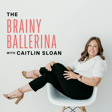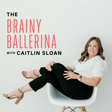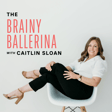
39. Ballet Through a Modern Lens: Emily Speed's Vision for AVID Dance
In this episode, I was joined by Emily Speed, founder and artistic director of AVID Dance, a project-based dance company presenting classical ballet through a modern lens.
Emily shares her journey dancing with renowned companies like Alabama Ballet, Ballet Tucson, Colorado Ballet, and Ballet Idaho. Now a principal guest artist and visionary leader, she discusses her mission to make ballet accessible and relevant to today's audiences.
Emily’s journey is a testament to resilience, adaptability, and creative courage. Her insights on turning obstacles into opportunities and redefining what classical ballet can be will inspire aspiring dancers and creative leaders alike.
Key Moments:
- [1:32] Early Dance Days: How a high-energy three-year-old found her calling in ballet
- [5:50] First Steps in the Corps de Ballet: The steep learning curve of transitioning from solo work to corps roles and how mentorship shaped Emily's growth
- [8:24] Transitioning to New Companies: How Emily used a major setback to spur her career forward and come back to Colorado Ballet
- [16:40] Making the Leap to Freelance Dance: Emily’s transition to freelance dance (while dealing with a major injury)
- [23:20] Reimagining Roles: Emily’s creative approach to characters like Bluebird and Clara to bring authenticity to the stage
- [29:20] Founding AVID Dance: How Emily's entrepreneurial spirit led to the creation of a dance company
- [37:13] Leadership & Artistic Balance: The challenges and joys of directing a company while still performing as a dancer
- [47:01] Powerful Advice for Dancers: Why dance should never define your entire identity and how to thrive amidst rejection and competition
Connect with Emily:
INSTAGRAM: instagram.com/aviddanceco
WEBSITE: AVIDdance.org
Links and Resources:
Set up ticketing for your next event with DRT (Make sure to mention that The Brainy Ballerina sent you!)
Get your copy of The Intentional Career Handbook
1-1 Career Mentoring: book your complimentary career call
Let’s connect!
My WEBSITE: thebrainyballerina.com
INSTAGRAM: instagram.com/thebrainyballerina
Questions/comments? Email me at caitlin@thebrainyballerina.com


